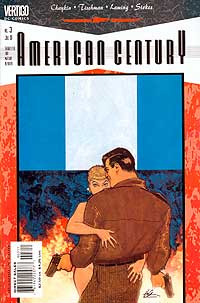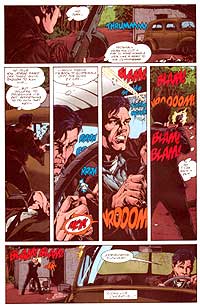
|
Not until the 1980s did the hard-boiled crime genre reappear anywhere near the comics mainstream. Howard Chaykin was one of the guys paddling the boat. His new series, "American Century," published by the "adult" Vertigo imprint of the very mainstream D.C. Comics, may well be his best work yet.
"American Century," ($2.50 each), a monthly, has just reached the third issue. Co-written by David Tischman and drawn by Marc Laming, Chaykin and company have already packed in enough for several other lesser titles. The first page of issue one starts us off in 1949 and sets the tone. As a man and woman reach climax inside a pretty, white, suburban house, we see the woman's husband, former WWII pilot Harry Block, popping pills and imagining pointing his commercial jetliner into a nosedive.

|
As with most things, for "American Century," it's the thoughtful details that make it rich. Harry is Jewish, and so on top of the loveless marriage, boring job and phony friends, he has to put up with the "sheenie" jabs. One day, after getting called back into service by Uncle Sam, he decides to take the cash and gun out of his mysterious safety-deposit box, pound some sense into his anti-Semite boss, and steal an airplane. Shot out the sky, he wrecks into the ocean and presumably finds a watery grave.
When in issue two, Harry inexplicably shows up in Guatemala, Chaykin folds political intrigue into the story. Apparently the U.S. makes a show of supporting the current dictator, while secretly preparing to put a hand-picked puppet in his place. Simultaneously the communists (secretly in cahoots with the dictator's amazonian wife) plan their own insurgency. Meanwhile, Harry has become a pilot smuggling arms to the communists, not for political reasons, but just for the thrill. Throw in some homosexual ex-pats, a whore named Carlita, a transvestite named Pinky, Russian secret agents and a sleazy representative of the "U.S. Fruit Company," and you pretty much have the definition of a modern pulp.
Frankly, it gets confusing. But the examination of dirty politics in the Americas gives Chaykin and Tischman the opportunity to add a whole extra layer of meaning to the not-so-unusual man-with-a-secret story.
Backroom political scheming is kept to a happy minimum as Chaykin makes sure to include enough cursing, killing, and nudity (not to mention fouled-toilet-bowl fishing), to keep action fans turning the page. Penciler Laming has a clear, almost photo-realist style that makes the book more reminiscent of a film than a comic. At the same time, the sharp inks by John Stokes give characters a strange, though not unpleasant, porcelain look— almost like Jeff Koons' pornographic sculptures.
"American Century" gives fans of hard-boiled crime fiction what they want: an escape into a secret, cynical world where morality drains out like blood into a gutter. Better still, it also gives comix fans what they want: an engaging story that stretches out to sophisticated commentary in a pop-culture guise. In 1952 such comics all but died after the institution of the Comics Code Authority. But now, assuming Howard Chaykin and company don't blow it, all at once mainstream pulp comics have caught up with their healthfully evolved book and movie relations.
"American Century" can be found at nearly all comicbook stores
